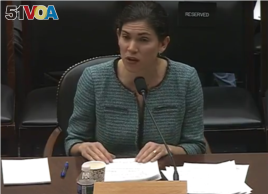10 March, 2018
The role of women and their possible help in fighting extremism is often ignored and underestimated, a group of experts told United States lawmakers recently.
Studies have shown that women can effectively communicate antiterrorism messages throughout families and communities, said Jamille Bigio. She noted that women can bring these messages to homes, schools and other social environments.
Bigio is a senior fellow for women and foreign policy at the Council on Foreign Relations. She spoke at a U.S. House of Representatives subcommittee hearing on the role of women in fighting terrorism around the world.
"Traditional efforts by governments and nongovernmental organizations to fight radicalization rarely include women," she told the hearing.
Bigio met last week with members of the Committee on Foreign Affairs' subcommittee on Terrorism, Nonproliferation and Trade. They called the meeting to discuss ways of overcoming what some lawmakers called a "strategic blind spot" in the efforts to stop extremism and terrorism.
Antiterrorism efforts have not given enough thought to the idea that women represent a resource in the fight against extremism, said Congressman Ted Poe, chairman of the subcommittee. Poe added that women are in a strong position to "challenge extremist narratives in homes, schools and societies the world over."

Jamille Bigio, a senior fellow for women and foreign policy at the Council on Foreign Relations
Sense of belonging
Haras Rafiq leads Quilliam International, a London-based research group that studies extremism around the world. He told lawmakers that the failure of communities to develop a shared sense of belonging is a major cause of the growth of extremism.
Rafiq said that a failure to teach democratic values also adds to the problem. "Challenging extremism is the duty of all responsible members" of communities, he added.
Another speaker was Valerie Hudson of the Bush School of Government and Public Service at Texas A&M University. She told the lawmakers that researchers have looked into several issues that have stopped women from acting to stop extremism and radicalization.
Hudson blamed rules governing property rights, marriage and other laws that prevent women from getting the resources needed to stop radicalization in the family.
"She doesn't have the say within her house," Hudson said.
She added those issues make women less effective in terms of stopping their sons and, sometimes their daughters, from becoming terrorists.
Economic possibilities
Another speaker at the hearing, Farhat Popal, is an official with the Women's Initiative at the George W. Bush Institute. She noted that education and economic opportunities for women are important to stopping violent extremism.
"Education and economic opportunities are two ways that we can work towards...development in Afghanistan," said Popal.
Her organization follows women's rights in many countries, including Afghanistan. She added that those opportunities will help stop extremism because it will build communities that have trust and inclusion.
Bigio, of the Council on Foreign Relations, said there is a strong need to bring women into the fight against extremism.
The Trump administration is "developing a new national counterterrorism strategy and a new national strategy in countering violent extremist groups," Bigio said, adding these should include women.
I'm Susan Shand.
________________________________________________________________
Words in This Story
role – n. a duty or part performed, especially as part of a process
senior fellow – n. a teaching position at a research center or university
radicalization – n. the process of becoming different or new from the traditional
strategic - adj. relating to a general plan that is created to achieve a goal in war, politics
resource – n. a supply of something; a thing that proves useful
challenge – v. to question the action or authority of
narrative - n. a story that is told in full detail
opportunity – n. a situation in which something can be done